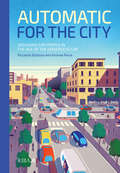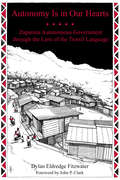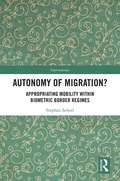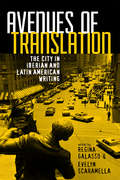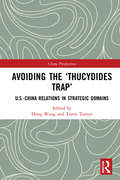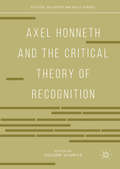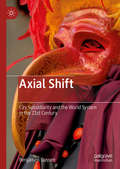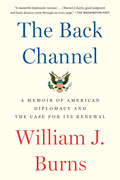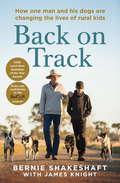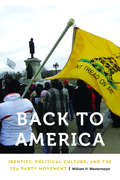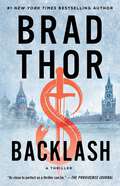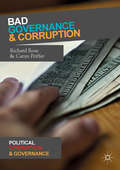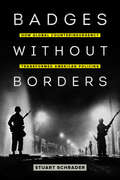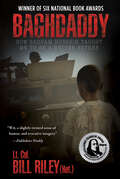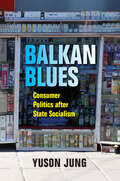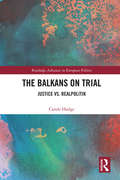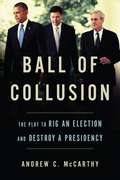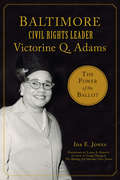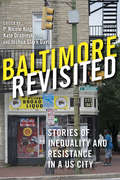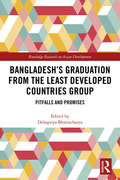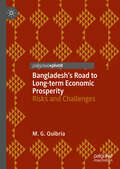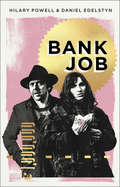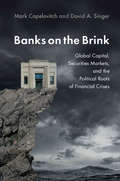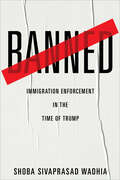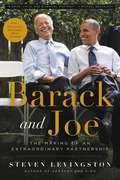- Table View
- List View
Automatic for the City: Designing for People In the Age of The Driverless Car
by Riccardo Bobisse Andrea Andrea PaviaHow will automated vehicles change our lives? Where are the opportunities and challenges? Future streets require planning today. This timely book envisions ways in which changes to urban mobility and technology will transform city streetscapes and, importantly, how cities can prepare. It is a reflection on the relationship between new technologies and urbanism, as well as an agile urban design manual with pictures illustrating potential spatial arrangements enabled by the new technologies. Two case studies in the central urban cores of London and Los Angeles will be presented to show how neighborhoods can be redesigned for the better and how to apply good urban design principles across towns and cities worldwide.
Autonomy Is in Our Hearts: Zapatista Autonomous Government through the Lens of the Tsotsil Language (KAIROS)
by Dylan Eldredge Fitzwater John P. ClarkFollowing the Zapatista uprising on New Year's Day 1994, the EZLN communities of Chiapas began the slow process of creating a system of autonomous government that would bring their call for freedom, justice, and democracy from word to reality. Autonomy Is in Our Hearts analyzes this long and arduous process on its own terms, using the conceptual language of Tsotsil, a Mayan language indigenous to the highland Zapatista communities of Chiapas. The words "Freedom," "Justice," and "Democracy" emblazoned on the Zapatista flags are only approximations of the aspirations articulated in the six indigenous languages spoken by the Zapatista communities. They are rough translations of concepts such as ichbail ta muk' or "mutual recognition and respect among equal persons or peoples," a'mtel or "collective work done for the good of a community" and lekil kuxlejal or "the life that is good for everyone." Autonomy Is in Our Hearts provides a fresh perspective on the Zapatistas and a deep engagement with the daily realities of Zapatista autonomous government. Simultaneously an exposition of Tsotsil philosophy and a detailed account of Zapatista governance structures, this book is an indispensable commentary on the Zapatista movement of today.
Autonomy of Migration?: Appropriating Mobility within Biometric Border Regimes (Interventions)
by Stephan ScheelExamining how migrants appropriate mobility in the context of biometric border controls, this volume mobilises new analytics and empirics in the debates about the politics of migration and provides an analytically effective and politically significant tool for the study of contemporary migration. Drawing from the tension between the EU’s attempt to achieve watertight border controls by means of biometric technologies, and migrants’ persistence to move to and live in the EU, the volume pursues two interrelated objectives: first, it studies the encounters between migrants and the Visa Information System (VIS), one of the largest biometric databases in the world, from the perspective of mobility in order to investigate how migrants appropriate mobility via Schengen visa within and against this biometric border regime. Second, it addresses criticisms of autonomy of migration in order to develop it as a viable approach for border, migration and critical security studies. Hence, the book is driven by two interrelated research questions: what does the assertion of moments of autonomy of migration refer to in the context of border regimes that use biometrics to turn migrants’ bodies into a means of mobility control? And how do migrants appropriate mobility via Schengen visa within and against biometric border regimes? This book will be of great interest to scholars in border, migration and critical security studies, as well as researchers engaged in citizenship studies, surveillance studies, political theory, critical IR theory and international political sociology.
Avenues of Translation: The City in Iberian and Latin American Writing
by Suzanne Levine Nicholas Goodbody Evelyn Scaramella Ilan Stavans Alicia Borinsky Christopher Maurer Charles Hatfield Jennifer Duprey Hugh Hazelton Esther Allen Urayoán Noel Peter Bush Regina GalassoCities both near and far communicate in a variety of ways. Travel between, through, and among urban centers initiates contact, and cities themselves are sites of ever-changing cultural and historical encounters. Predictable and surprising challenges and opportunities arise when city borders are crossed, voices meet, and artistic traditions find their counterparts. Using the Latin word for “translation,” translatio, or “to carry across,” as a point of departure, Avenues of Translation explores how translation perpetuates, diversifies, deepens, and expands the literary production of cities in their greater cultural context, and how translation shapes an understanding of and access to a city's past and present literary and cultural practices. Thinking about translation and the city is a way to tell the backstories of the cities, texts, and authors that are united by acts of translation. Published by Bucknell University Press. Distributed worldwide by Rutgers University Press.
Avoiding the ‘Thucydides Trap’: U.S.-China Relations in Strategic Domains (China Perspectives)
by Dong Wang; Travis TannerAs the relationship between China and the United States becomes increasingly complex and interdependent, leaders in Beijing and Washington are struggling to establish a solid common foundation on which to expand and deepen bilateral relations. In order to examine the challenges facing U.S.-China relations, the National Bureau of Asian Research (NBR) and the Institute for Global Cooperation and Understanding (iGCU) at Peking University brought together a group of leading experts from China and the United States in Beijing and Honolulu to develop a conceptual foundation for U.S.-China relations into the future, tackling the issues in innovative ways under the banner of U.S.-China Relations in Strategic Domains. The resulting chapters assess U.S.-China relations in the maritime and nuclear sectors as well as in cyberspace and space and through the lens of P2P and mil-to-mil exchanges. Scholars and students in political science and international relations are thus presented with a diagnosis and prognosis of the relations between the two superpowers.
Axel Honneth and the Critical Theory of Recognition (Political Philosophy and Public Purpose)
by Volker SchmitzThe critical theory of the Frankfurt School has undergone numerous and at times fundamental changes over the last ninety years. Since the late 1960s, it has been characterized primarily by Jürgen Habermas’s “communicative turn” and a focus on normative foundations. Today, that “second generation” exists side-by-side with a “third generation” represented most prominently by Axel Honneth’s turn toward recognition, ethical life, and the normative reconstruction of social institutions. This volume brings together critical voices on the state and direction of Frankfurt School theory today by examining Honneth’s theory in light of both current challenges and the intellectual and political ambitions that have shaped the tradition from its beginning. United in their strong commitment to critical scholarship, the authors collected here approach Honneth’s work from different backgrounds, employ a wide variety of methodologies, and write in different genres, ranging from the sober scholarly analysis to programmatic and political appeals. The collective aim of these reflections is not to reject Honneth’s theory but to build upon his work and incorporate his themes of recognition and social freedom into a new project of critical theory that can prove adequate to the political and social crises of our time.
Axial Shift: City Subsidiarity and the World System in the 21st Century
by Benjamen GussenThis book uses historical analysis, constitutional economics, and complexity theory to furnish an account of city subsidiarity as a legal, ethical, political, and economic principle. The book contemplates subsidiarity as a constitutional principle, where cities would benefit from much wider local autonomy. Constitutional economics suggests an optimal limit to jurisdictional footprints (territories). This entails preference for political orders where sovereignty is shared between different cities rather states where capital cities dominate. The introduction of city subsidiarity as a constitutional principle holds the key to economic prosperity in a globalizing world. Moreover, insights from complexity theory suggest subsidiarity is the only effective response to the ‘problem of scale.’ It is a fitness trait that prevents highly complex systems from collapsing. The nation-state is a highly complex system within which cities function as ‘attractors.’ The collapse of such systems would ensue if there were strong coupling between attractors. Such coupling obtains under legal monism. Only subsidiarity can make the eventuality of collapse improbable. The emergent and self-organizing properties of subsidiarity entail a shift in policy emphasis towards cities with a wide margin of autonomy.
The Back Channel: A Memoir of American Diplomacy and the Case for Its Renewal
by William J. Burns“Bill Burns is a treasure of American diplomacy.”—Hillary Clinton“The Back Channel shows how diplomacy works, why it matters, and why its recent demise is so tragic.”—Walter Isaacson, author of Leonardo da VinciOver the course of more than three decades as an American diplomat, William J. Burns played a central role in the most consequential diplomatic episodes of his time—from the bloodless end of the Cold War to the collapse of post–Cold War relations with Putin’s Russia, from post–9/11 tumult in the Middle East to the secret nuclear talks with Iran.In The Back Channel, Burns recounts, with novelistic detail and incisive analysis, some of the seminal moments of his career. Drawing on a trove of newly declassified cables and memos, he gives readers a rare inside look at American diplomacy in action. His dispatches from war-torn Chechnya and Qaddafi’s bizarre camp in the Libyan desert and his warnings of the “Perfect Storm” that would be unleashed by the Iraq War will reshape our understanding of history—and inform the policy debates of the future. Burns sketches the contours of effective American leadership in a world that resembles neither the zero-sum Cold War contest of his early years as a diplomat nor the “unipolar moment” of American primacy that followed.Ultimately, The Back Channel is an eloquent, deeply informed, and timely story of a life spent in service of American interests abroad. It is also a powerful reminder, in a time of great turmoil, of the enduring importance of diplomacy.Advance praise for The Back Channel“Bill Burns is simply one of the finest U.S. diplomats of the last half century. The Back Channel demonstrates his rare and precious combination of strategic insight and policy action. It is full of riveting historical detail but also, more important, shrewd insights into how we can advance our interests and values in a world where U.S. leadership remains the linchpin of international order.”—James A. Baker III“From one of America’s consummate diplomats, The Back Channel is an incisive and sorely needed case for the revitalization of diplomacy—what Burns wisely describes as our ‘tool of first resort.’”—Henry Kissinger“Burns not only offers a vivid account of how American diplomacy works, he also puts forward a compelling vision for its future that will surely inspire new generations to follow his incredible example.”—Madeleine K. Albright
Back on Track: How one man and his dogs are changing the lives of rural kids
by James Knight Bernie ShakeshaftAs a kid, Bernie Shakeshaft's mischievous and reckless behaviour led him to became known as the wild one of his devout Catholic family. It isn't surprising that his path led him to the Northern Territory, a place where people often go to either lose themselves or find themselves. Bernie, a searcher for his purpose in life, found himself.He had many jobs, firstly as a ringer on a cattle station owned by the Packer family, and later as a dingo trapper for the Parks and Wildlife Service. Throughout it all, he drank, he swore, he fought, and took chances with his own well-being. But, crucially, he also developed deep connections with the Indigenous people, and it was these connections that helped lay the foundations for what was to come. He worked for youth welfare organisations, and all the while he built up his knowledge about helping wayward youths, particularly those from Indigenous communities.Years later, Bernie was living in Armidale. He'd been visiting too many kids in prison and going to too many funerals. The usual methods weren't working so that reckless, mischievous kid inside him decided he could do better. He started a youth program called BackTrack, with three aims: To keep them alive, out of jail and chasing their hopes and dreams. For most, this was their last chance. Combining life skills, education, job preparedness with rural work, Bernie threw in one other factor: dogs! And it works. With the help of these working dogs, the lost boys (and girls) find their way back on track. These days, Backtrack youth tour the country competing in dog-jumping trials. Bernie and the BackTrack team are now supporting other communities in Lake Cargelligo, Broken Hill, Dubbo and Grafton and have forged a new beginning for over 1000 young people. This one man is making a huge difference.In Back on Track, bestselling author James Knight tells Bernie's story and the stories of those whose lives he has saved. It is a powerful reminder that we should never give up on our kids.'This fella Bernie, he's a good fella, a bit of a genius really. What a great story.' - Russell Crowe
Back to America: Identity, Political Culture, and the Tea Party Movement (Anthropology of Contemporary North America)
by William H. WestermeyerBack to America is an ethnography of local activist groups within the Tea Party, one of the most important recent political movements to emerge in the United States and one that continues to influence American politics. Though often viewed as the brainchild of conservative billionaires and Fox News, the success of the Tea Party movement was as much, if not more, the result of everyday activists at the grassroots level. William H. Westermeyer traces how local Tea Party groups (LTPGs) create submerged spaces where participants fashion action-oriented collective and personal political identities forged in the context of cultural or figured worlds. These figured worlds allow people to establish meaningful links between their own lives and concerns, on the one hand, and the movement&’s goals and narratives, on the other. Collectively, the production and circulation of the figured worlds within LTPGs provide the basis for subjectivities that often nurture political activism. Westermeyer reveals that LTPGs are vibrant and independent local organizations that, while constantly drawing on nationally disseminated cultural images and discourses, are far from simple agents of the larger organizations and the media. Back to America offers a welcome anthropological approach to this important social movement and to our understanding of grassroots political activism writ large.
Backlash: A Thriller (The Scot Harvath Series #18)
by Brad Thor&“Raw emotion, nonstop action, and relentless pacing makes Backlash another one-night read from Brad Thor.&” —The Real Book Spy #1 New York Times and #1 Wall Street Journal bestselling author Brad Thor is back with his most gripping thriller yet!In ancient texts, there are stories about men who struck from the shadows, seemingly beyond the reach of death itself. These men were considered part angel, part demon. Their loyalty was to their families, their friends, and their kings. You crossed these men at your peril. And once crossed, there was no crossing back. They were fearless; men of honor who have been known throughout history by different names: Spartan, Viking, Samurai. Today, men like these still strike from the shadows. They are highly prized intelligence agents, military operatives, and assassins. One man is all three. Two days ago, that man was crossed—badly. Now, far from home and surrounded by his enemy, Scot Harvath must battle his way out. In the most explosive novel Brad Thor has ever written, page after captivating page of action, intrigue, loyalty, and betrayal will keep you hooked until the very last sentence.
Bad Governance and Corruption (Political Corruption and Governance)
by Richard Rose Caryn PeifferThis book explains why the role of corruption varies greatly between public services, between people, between national systems of governance, and between measures of corruption. More than 1.8 billion people pay the price of bad government each year, by sending a bribe to a public official. In developing countries, corruption affects social services, such as health care and education, and law enforcement institutions, such as the police. When public officials do not act as bureaucrats delivering services by the book, people can try to get them by hook or by crook. The book’s analysis draws on unique evidence: a data base of sample surveys of 175,000 people in 125 countries in Africa, Asia, the Middle East, Europe, and North and South America. The authors avoid one-size-fits-all proposals for reform and instead provide measures that can be applied to particular public services to reduce or eliminate opportunities for corruption.
Badges without Borders: How Global Counterinsurgency Transformed American Policing (American Crossroads #56)
by Stuart SchraderFrom the Cold War through today, the U.S. has quietly assisted dozens of regimes around the world in suppressing civil unrest and securing the conditions for the smooth operation of capitalism. Casting a new light on American empire, Badges Without Borders shows, for the first time, that the very same people charged with global counterinsurgency also militarized American policing at home. In this groundbreaking exposé, Stuart Schrader shows how the United States projected imperial power overseas through police training and technical assistance—and how this effort reverberated to shape the policing of city streets at home. Examining diverse records, from recently declassified national security and intelligence materials to police textbooks and professional magazines, Schrader reveals how U.S. police leaders envisioned the beat to be as wide as the globe and worked to put everyday policing at the core of the Cold War project of counterinsurgency. A “smoking gun” book, Badges without Borders offers a new account of the War on Crime, “law and order” politics, and global counterinsurgency, revealing the connections between foreign and domestic racial control.
Baghdaddy: How Saddam Hussein Taught Me to Be a Better Father
by Lt. Col. Bill RileyAmerican Book Fest’s Best Book Awards Winner for Best Nonfiction Book of 2019 Military Writers Society of America Multiple Award-Winner: Founder’s Award for Standout Book of 2019 Gold Medal Award for Memoir category For readers of Educated and The Glass Castle, a moving new memoir about survival, family, and a humanizing insight into the individuals who fight the nation’s wars. As a child, he was raised in an unstable and violent home by a mother struggling with mental illness. An absent father with a firm belief in tough love left him with only his sister to understand or comfort him as they faced a home full of harshness, resentment, and physical abuse. As a man, he braved the war-torn landscapes of Kuwait, Iraq, and Saudi Arabia. Having learned early from his father that only the strong survive, he enlisted in the Air Force after high school and began an impressive military career in intelligence analysis, communications, and supporting special operations, meeting incredible individuals along the way. In his time overseas he faced harsh realities of the politics of war, the consequences of military actions, and the challenge of attempting to rebuild a country while its own people are trying to kill you. Baghdaddy is Bill Riley’s memoir: an honest and colorful depiction of his journey through a turbulent youth and into a challenging adulthood. This very human account of living in some of the least humane environments delivers the message that no matter how different we seem, we are all trying to make the best of life and learn how to be the best versions of ourselves.
Balkan Blues: Consumer Politics after State Socialism (New Anthropologies of Europe)
by Yuson JungAn exploration of how a state transitions from the collectivized production and distribution of socialism to the consumer-focused culture of capitalism.In Balkan Blues, Yuson Jung considers the state as an economic agent in upholding rights and responsibilities in the shift to a global market. Taking Bulgaria as her focus, Jung shows how impoverished Bulgarians developed a consumer-oriented society and how the concept of “need’ adapted in surprising ways to accommodate this new culture.Different legal frameworks arose to ensure the rights of vulnerable or deceived consumers. Consumer advocacy NGOs and government officers scrambled to navigate unfamiliar EU-imposed models for consumer affairs departments. All of these changes involved issues of responsibility, accountability, and civic engagement, which brought Bulgarians new ways of viewing both their identities and their sense of agency. Yet these opportunities also raised questions of inequality, injustice, and social stratification. Jung’s study provides a compelling argument for reconsidering of the role of the state in the construction of twenty-first-century consumer cultures.“A good contribution to post-socialist and Balkan studies, showing well that the concept of post-socialism can still be useful not only in the context of Central and Eastern Europe, but also in the Balkans. The book is based on long-term, deep ethnography and is well written . . . I recommend it to anyone who wants to try to understand social, political, and economic differences in Europe and everyday practices related to the (imaginaries of the) state.” —Karolina Bielenin-Lenczowska, Ethnologia Polona
The Balkans on Trial: Justice vs. Realpolitik (Routledge Advances in European Politics)
by Carole HodgeThis book assesses the International Criminal Tribunal for former Yugoslavia’s (ICTY) legacy and examines the conflicting intersection of law and politics in the search for justice, both thematically and through close analysis of some of the major trials. It analyses the related case brought against Serbia and Montenegro by Bosnia and Herzegovina at the International Court of Justice (ICJ), as well as the Ganic case in London where the ICTY and ICJ findings were challenged. The book addresses the following questions: To what extent the political climate in which the ICTY was conceived, and continues to operate, has affected the declared aims of its founders? Have political considerations and political correctness, and the perceived need for political stability and democratic transition, at times proved an obstacle to the administration of justice? Are some of the acknowledged failings of international policy in the 1990s finding some resonance in more recent court proceedings? This highly relevant and comprehensive book will be of interest to students and scholars of political science, international relations, transitional justice, Balkan area studies, human rights law, international criminal and peace and conflict studies.
Ball of Collusion: The Plot to Rig an Election and Destroy a Presidency
by Andrew McCarthy<p>The real collusion in the 2016 election was not between the Trump campaign and the Kremlin. It was between the Clinton campaign and the Obama administration. <p>The media–Democrat “collusion narrative,” which paints Donald Trump as cat’s paw of Russia, is a studiously crafted illusion. <p>Despite Clinton’s commanding lead in the polls, hyper-partisan intelligence officials decided they needed an “insurance policy” against a Trump presidency. Thus was born the collusion narrative, built on an anonymously sourced “dossier,” secretly underwritten by the Clinton campaign and compiled by a former British spy. Though acknowledged to be “salacious and unverified” at the FBI’s highest level, the dossier was used to build a counterintelligence investigation against Trump’s campaign. <p>Miraculously, Trump won anyway. But his political opponents refused to accept the voters’ decision. Their collusion narrative was now peddled relentlessly by political operatives, intelligence agents, Justice Department officials, and media ideologues―the vanguard of the “Trump Resistance.” Through secret surveillance, high-level intelligence leaking, and tireless news coverage, the public was led to believe that Trump conspired with Russia to steal the election. <p>Not one to sit passively through an onslaught, President Trump fought back in his tumultuous way. Matters came to a head when he fired his FBI director, who had given explosive House testimony suggesting the president was a criminal suspect, despite privately assuring Trump otherwise. The resulting firestorm of partisan protest cowed the Justice Department to appoint a special counsel, whose seemingly limitless investigation bedeviled the administration for two years. <p>Yet as months passed, concrete evidence of collusion failed to materialize. Was the collusion narrative an elaborate fraud? And if so, choreographed by whom? Against media–Democrat caterwauling, a doughty group of lawmakers forced a shift in the spotlight from Trump to his investigators and accusers. This has exposed the depth of politicization within American law-enforcement and intelligence agencies. It is now clear that the institutions on which our nation depends for objective policing and clear-eyed analysis injected themselves scandalously into the divisive politics of the 2016 election. <p>They failed to forge a new Clinton administration. Will they succeed in bringing down President Trump?</p>
Baltimore Civil Rights Leader Victorine Q. Adams: The Power of the Ballot (American Heritage)
by Ida E. JonesVictorine Quille Adams was a Baltimore native and the first African American woman elected to the city council. Born in 1912, she lived through stringent segregation, racial violence and economic turbulenceVictorine Quille Adams was a Baltimore native and the first African American woman elected to the city council. Born in 1912, she lived through stringent segregation, racial violence and economic turbulence.Educated at Morgan State and Coppin State Universities, she took to the classroom and enriched the lives of her students. In 1946, she founded the Colored Women's Democratic Campaign Committee to educate African American women about the vote and the power of the ballot box. In concert with fellow educators Mary McLeod Bethune, Kate Sheppard and Dr. Delores Hunt, she persisted in educating and empowering voters throughout her life. Author Ida E. Jones reveals the story of this civic leader and her crusade for equity for all people in Baltimore.
Baltimore Revisited: Stories of Inequality and Resistance in a U.S. City
by Lawrence Brown Daniel L. Buccino Michael Casiano Sam Collins Shannon Darrow Matthew Durington Nicole Fabricant Aiden Faust Jennifer A. Ferretti Leif Fredrickson Robert Gamble Marisela Gomez April K. Householder Jodi Kelber-Kaye Louise Parker Kelley Emily Lieb Jacob R. Levin Teresa Méndez Ashley Minner Elizabeth M. Nix Richard E. Otten Eli Pousson Mary Rizzo Fred Scharmen Aletheia Hyun-Jin Shin Linda Shopes Michelle L. Stefano Joe Tropea Amy Zanoni Denise Meringolo Robert Headley Shawntay StocksNicknamed both “Mobtown” and “Charm City” and located on the border of the North and South, Baltimore is a city of contradictions. From media depictions in The Wire to the real-life trial of police officers for the murder of Freddie Gray, Baltimore has become a quintessential example of a struggling American city. Yet the truth about Baltimore is far more complicated—and more fascinating. To help untangle these apparent paradoxes, the editors of Baltimore Revisited have assembled a collection of over thirty experts from inside and outside academia. Together, they reveal that Baltimore has been ground zero for a slew of neoliberal policies, a place where inequality has increased as corporate interests have eagerly privatized public goods and services to maximize profits. But they also uncover how community members resist and reveal a long tradition of Baltimoreans who have fought for social justice. The essays in this collection take readers on a tour through the city’s diverse neighborhoods, from the Lumbee Indian community in East Baltimore to the crusade for environmental justice in South Baltimore. Baltimore Revisited examines the city’s past, reflects upon the city’s present, and envisions the city’s future.
Bangladesh's Graduation from the Least Developed Countries Group: Pitfalls and Promises (Routledge Research on Asian Development)
by Debapriya BhattacharyaSince the group of least developed countries (LDCs) was identified in 1971, only five countries have graduated from the group, all of which are characterised by small size or population. The projections are that the next decade will see a rapid increase in the pace of graduation, with Bangladesh in particular poised to be one of the largest countries, in terms of its economy and population, yet to leave the group. While previously many LDCs viewed the prospect of graduation with some apprehension, fearing significant erosion of international support, increasingly, the move is being seen as a more positive landmark. This book aims to articulate appropriate strategies and initiatives to help Bangladesh to maintain its developmental momentum and to prepare for a sustainable graduation in 2024. In doing so, the book explores themes such as key analytical issues of the LDC graduation paradigm, smooth transition and structural transformation, and post-graduation challenges and opportunities. Further, against the backdrop of Gross National Income per capita, the Human Assets Index and Economic Vulnerability Index goals required for graduation, the Sustainable Development Goals (SDGs) set by the 2030 Agenda will also be in the process of implementation. Whilst some feel that the two agendas might be in conflict, the book teases out some of the important synergies which can be drawn when LDCs are undertaking the journey of graduation in the era of the SDGs. The book also takes into cognisance the uncertain external environment and the emerging global scenario within which Bangladesh's graduation is to take place. Conceptual discourse around LDC graduation and the particular narrative around Bangladesh's journey towards LDC graduation will be of interest not only to scholars of Bangladesh, but also to researchers and policymakers with an interest in LDC graduation for other countries facing similar challenges.
Bangladesh's Road to Long-term Economic Prosperity: Risks and Challenges
by M. G. Quibria“A must read for anyone interested in understanding complexities of development process.”–Fakhruddin Ahmed, former Governor of the Central Bank of Bangladesh“Policy makers and general readers including specialists would find this lucid analysis very useful.”– Nurul Islam, Deputy Chairman of the First Planning commission of Bangladesh“The author provides both valuable caution and useful guides to everyone interested in Bangladesh’s economic future.”– Salim Rashid, Emeritus Professor of Economics, University of Illinois, USAThis book examines the recent emergence of Bangladesh as one of the fastest growing economies in the world. Identified by Goldman Sachs as being on a meteoric economic rise, the country has dwarfed India in social improvement also. Attempting to build on these successes, the Bangladeshi government has set the ambitious aim of attaining the status of fully developed country by 2041. This study identifies the trifecta of major risks which could derail Bangladesh’s upwards trajectory: the rapid development of robotics and artificial development, the uncertain political and economic global landscape, and the constant threat of climate change and natural disasters. In order to stay on track, the government will need to address various social, political, policy and institutional challenges facing the economy, including poor governance, inadequate physical infrastructure, skill and educational bottlenecks, demographic burden, dwindling social capital and lack of transformational leadership.
Bank Job
by Hilary Powell Daniel EdelstynArt hacks life when two filmmakers launch a project to cancel more than £1m of high-interest debt from their local community. Bank Job is a white-knuckle ride into the dark heart of our financial system, in which filmmaker and artist duo Hilary Powell and Dan Edelstyn risk their sanity to buy up and abolish debt by printing their own money in a disused bank in Walthamstow, London. Tired of struggling in an economic system that leaves creative people on the fringes, the duo weave a different story, both risky and empowering, of self-education and mutual action. Behind the opaque language and defunct diagrams, they find a system flawed by design but ripe for hacking. This is the inspiring story of how they listen and act upon the widespread desire to change the system to meet the needs of many and not just the few. And for those among us brave enough, they show how we can do this too in our own communities one bank job at a time.
Banks on the Brink: Global Capital, Securities Markets, and the Political Roots of Financial Crises (Political Economy of Institutions and Decisions)
by Mark Copelovitch David A. SingerThis innovative analysis investigates a complex issue of tremendous economic and political importance: what makes some countries vulnerable to banking crises, while others emerge unscathed? Banks on the Brink explains why some countries are more vulnerable to banking crises than others. Copelovitch and Singer highlight the effects of two variables in combination: foreign capital inflows and the relative prominence of securities markets in the domestic financial system. Foreign capital is the fuel for banks' potentially dangerous behavior, and banks are more likely to take on excessive risks when operating in a financial system with large securities markets. The book analyzes over thirty years of data and provides historical case studies of two key countries, Canada and Germany, each of which explores how political decisions in the 19th and early-20th centuries continue to affect financial stability today. The analyses in this book have crucial policy implications, identifying potential regulations and policies that can work to protect banking systems against future crises.
Banned: Immigration Enforcement in the Time of Trump
by Shoba Sivaprasad WadhiaWinner, 2020 Best Book Award, Law Category, given by the American Book FestExamines immigration enforcement and discretion during the first eighteen months of the Trump administrationWithin days of taking office, President Donald J. Trump published or announced changes to immigration law and policy. These changes have profoundly shaken the lives and well-being of immigrants and their families, many of whom have been here for decades, and affected the work of the attorneys and advocates who represent or are themselves part of the immigrant community. Banned examines the tool of discretion, or the choice a government has to protect, detain, or deport immigrants, and describes how the Trump administration has wielded this tool in creating and executing its immigration policy.Banned combines personal interviews, immigration law, policy analysis, and case studies to answer the following questions: (1) what does immigration enforcement and discretion look like in the time of Trump? (2) who is affected by changes to immigration enforcement and discretion?; (3) how have individuals and families affected by immigration enforcement under President Trump changed their own perceptions about the future?; and (4) how do those informed about immigration enforcement and discretion describe the current state of affairs and perceive the future? Shoba Sivaprasad Wadhia pairs the contents of these interviews with a robust analysis of immigration enforcement and discretion during the first eighteen months of the Trump administration and offers recommendations for moving forward.The story of immigration and the role immigrants play in the United States is significant. The government has the tools to treat those seeking admission, refuge, or opportunity in the United States humanely. Banned offers a passionate reminder of the responsibility we all have to protect America’s identity as a nation of immigrants.
Barack and Joe: The Making of an Extraordinary Partnership
by Steven LevingstonA vivid and inspiring account of the "bromance" between Barack Obama and Joe Biden.The extraordinary partnership of Barack Obama and Joe Biden is unique in American history. The two men, their characters and styles sharply contrasting, formed a dynamic working relationship that evolved into a profound friendship. Their affinity was not predestined. Obama and Biden began wary of each other: Obama an impatient freshman disdainful of the Senate's plodding ways; Biden a veteran of the chamber and proud of its traditions. Gradually they came to respect each other's values and strengths and rode into the White House together in 2008. Side-by-side through two tension-filled terms, they shared the day-to-day joys and struggles of leading the most powerful nation on earth. They accommodated each other's quirks: Biden's famous miscues kept coming, and Obama overlooked them knowing they were insignificant except as media fodder. With his expertise in foreign affairs and legislative matters, Biden took on an unprecedented role as chief adviser to Obama, reshaping the vice presidency. Together Obama and Biden guided Americans through a range of historic moments: a devastating economic crisis, racial confrontations, war in Afghanistan, and the dawn of same-sex marriage nationwide. They supported each other through highs and lows: Obama provided a welcome shoulder during the illness and death of Biden's son Beau. As many Americans turn a nostalgic eye toward the Obama presidency, Barack and Joe offers a new look at this administration, its absence of scandal, dedication to truth, and respect for the media. This is the first book to tell the full story of this historic relationship and its substantial impact on the Obama presidency and its legacy.
